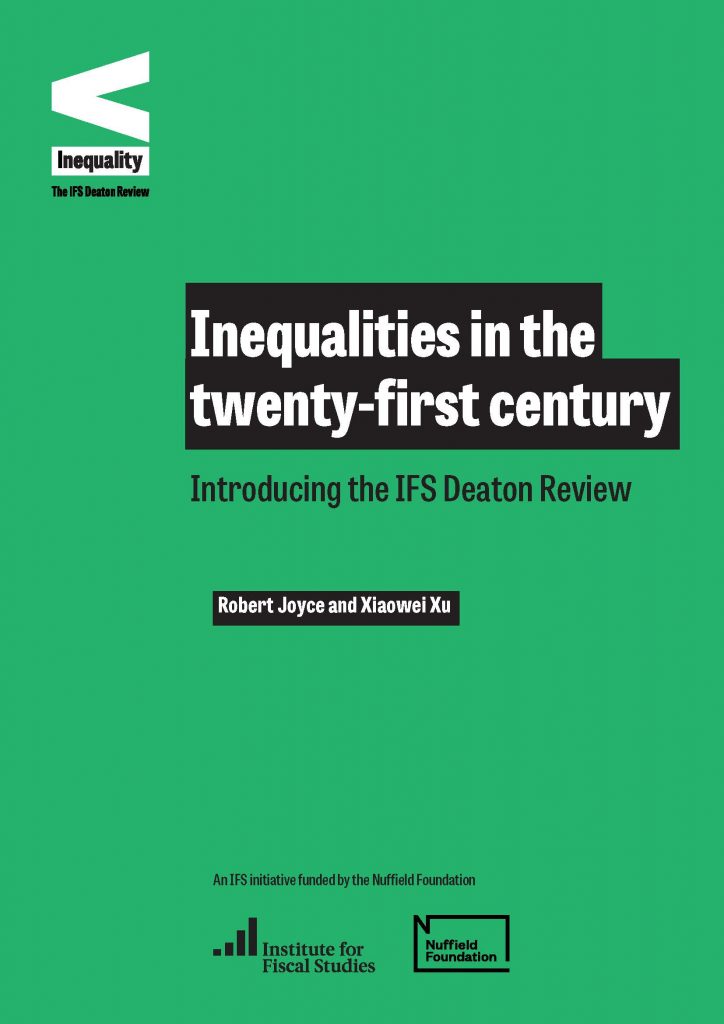Inequalities are at the forefront of today’s public and policy debates. They have been linked to some of the most important political events, including the rise of populism across the developed world and the vote for Brexit, and have sparked worldwide protest movements. There could hardly be a more pressing time to understand how inequalities arise, which ones matter, why they matter, and how they should be addressed.
We see inequalities all the time, whether at the school gates, the hospital, when travelling round the country – or even a single town – or when turning on the news. But at any moment we typically encounter, or hear about, one specific type of inequality, a specific alleged cause of it, or a specific proposed solution.
Inequalities are too pervasive and too complex for us to stop at that. We need to step back and ask: how are different kinds of inequality related, which matter most, what are the big forces that combine to create them, and what is the right mix of policies to tackle them?
“I am delighted that IFS and the Nuffield Foundation have launched this review, and am honoured that I have been asked to chair it. It is an exciting prospect to work with so many distinguished scholars in so many disciplines to try to understand more about the nature of inequality, what it is about inequality that upsets so many people, and what might be done about it.”
Professor Sir Angus Deaton, Nobel Laureate and Chair of the Review
This project aims to rise to that challenge. In the most ambitious study of its kind yet attempted, we will aim to understand inequality not just of income, but of health, wealth, political participation, and opportunity; and not just between rich and poor but by gender, ethnicity, geography, age and education. We will cover the full breadth of the population – not just what is happening at the very top and very bottom. We will examine what concerns people about inequality, what aspects of it are perceived to be fair and unfair, and how those concerns relate to the actual levels of inequality and the processes by which they are created. We will examine the big forces that drive inequalities – from technological change, globalisation, labour markets and corporate behaviour to family structures and education systems.
“There can be few things more important than understanding what drives the inequalities we see in the UK, and what we can do to mitigate them. I couldn’t be more delighted that, in this 50th anniversary year of the IFS, we will be working with Sir Angus and other world leading experts to answer some of the most pressing questions facing not only the UK but the Western world as a whole.”
Paul Johnson, IFS director
Crucially, we will examine the role of policies, from taxes and benefits through to trade policy, education policies, the labour market, regional development, competition policy and regulation. This will give the UK government, and those in other developed countries, a far clearer and more holistic view of the effectiveness of available policy options, how they can best work alongside each other and the trade-offs between them.
With the Nobel Laureate Professor Sir Angus Deaton in the chair, the panel overseeing the project includes world-leading experts in sociology, epidemiology, political science, philosophy and economics. The project will draw on contributions from dozens more experts with diverse areas of expertise and perspectives.
“The nature of inequality, and the forms it takes, are changing rapidly in the 21st century and it is an issue that lies at the heart of our political discourse. It is inherent to the increasingly vehement debate around concepts of fairness, rights, gender, ethnicity and identity. As an independent funder, the Nuffield Foundation sees the Deaton Review as a project central to our purpose to define and enhance opportunity and social well-being. The evidence and argument that will come from the thinking of such a distinguished panel, led by Sir Angus Deaton, has the potential to refashion what we know about inequality and present viable policy options for securing a more emancipated and inclusive society.”
Tim Gardam, Chief Executive of the Nuffield Foundation
